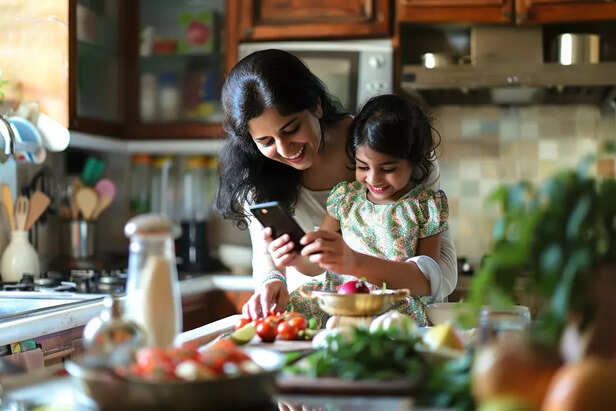Daily Habits of Emotionally Intelligent People (Indian Perspective)
Annanya Saxena | Sep 08, 2025, 19:05 IST
Emotional well being
( Image credit : Freepik )
In India, emotional intelligence flows from culture. Morning rituals like lighting a diya, pranayama, or reading the Gita set a calm tone. Families show gratitude before meals and listen with patience during chai time. Living in joint families teaches Indians to read emotions through subtle signs like body language or tone shifts. Daily check-ins with loved ones and bedtime reflection deepen emotional awareness. These simple, consistent habits show how Indian traditions naturally build resilience, empathy, and joy.
People in India handle emotions differently than those in Western countries. Our traditions of yoga and joint families teach us to read feelings better. Here are simple daily habits that emotionally smart Indians follow.

Smart people start their day with 15 minutes of quiet time. This could be prayer at the home temple or sitting on the balcony with morning tea. Aarti sounds from nearby temples help many Indians center themselves before rushing into daily tasks.

Indians with high emotional smarts listen with their whole body. They put away phones during chai time and make eye contact when family members speak. This comes from our respect for elders and the value we place on relationships. Watch how your grandmother listens. She nods, asks follow-up questions, and remembers what you told her last week. She picks up on your mood from your voice tone alone.

Before dinner, many Indian families share one good thing from their day. This simple practice trains the brain to notice positive moments instead of dwelling on problems.

Living in joint families teaches Indians to spot mood changes quickly. Which makes it better for the people around you.

Indians maintain emotional bonds through daily check-ins. Smart people call their parents every evening and text cousins on festival days. They visit neighbors when someone falls sick.

Before sleep, emotionally aware Indians think about their day without harsh judgment. They ask simple questions about their actions and feelings.
Bedtime reflection questions:
Our culture naturally builds emotional intelligence. Joint families teach patience. Religious festivals create shared joy. Daily prayers connect us to bigger purposes. These habits don't cost money or need special training. They grow from values Indians already hold respect for family, gratitude for what we have, and care for community members.
The secret to this lies in consistency and not perfection. Some Small daily steps toward emotional awareness create big changes in relationships and personal happiness.
Explore the latest trends and tips in Health & Fitness, Spiritual, Travel, Life Hacks, Trending, Fashion & Beauty, and Relationships at Times Life!
Wake Up with Purpose

Waking up with purpose
( Image credit : Freepik )
Smart people start their day with 15 minutes of quiet time. This could be prayer at the home temple or sitting on the balcony with morning tea. Aarti sounds from nearby temples help many Indians center themselves before rushing into daily tasks.
Morning rituals that work:
- Light a diya and say a quick prayer
- Sit quietly while drinking ginger tea
- Read one page from the Bhagavad Gita
- Do five minutes of pranayama breathing
Master the Art of Listening

Art of listening
( Image credit : Freepik )
Indians with high emotional smarts listen with their whole body. They put away phones during chai time and make eye contact when family members speak. This comes from our respect for elders and the value we place on relationships. Watch how your grandmother listens. She nods, asks follow-up questions, and remembers what you told her last week. She picks up on your mood from your voice tone alone.
Signs of good listening:
- Putting the phone face down during talks
- Asking "How did that make you feel?"
- Remembering small details from past chats
- Giving full attention without interrupting
Count Your Blessings Daily

Comfort of Indian food
( Image credit : Freepik )
Before dinner, many Indian families share one good thing from their day. This simple practice trains the brain to notice positive moments instead of dwelling on problems.
Things Indians feel grateful for:
- Mom's homemade dal and rice
- Safe travel on crowded buses
- Kind words from a colleague
- Children's good health and grades
Read People Like Books

A joyful woman
( Image credit : Freepik )
Living in joint families teaches Indians to spot mood changes quickly. Which makes it better for the people around you.
They watch for subtle signs:
- Changed voice patterns during phone calls
- Different walking styles when someone feels upset
- Facial expressions that don't match spoken words
- Body language that signals stress or joy
Stay Connected to Your Circle

Talking to grandparents
( Image credit : Freepik )
Indians maintain emotional bonds through daily check-ins. Smart people call their parents every evening and text cousins on festival days. They visit neighbors when someone falls sick.
Daily connection habits:
- Evening calls to parents or grandparents
- WhatsApp messages in family groups
- Quick visits to check on elderly neighbors
- Sharing homemade sweets during festivals
End with Self-Reflection

Self reflection
( Image credit : Freepik )
Before sleep, emotionally aware Indians think about their day without harsh judgment. They ask simple questions about their actions and feelings.
Bedtime reflection questions:
- Did I lose my temper today?
- How did I treat the house help?
- What made me smile today?
- How can I do better tomorrow?
Why This Works in India
The secret to this lies in consistency and not perfection. Some Small daily steps toward emotional awareness create big changes in relationships and personal happiness.
Explore the latest trends and tips in Health & Fitness, Spiritual, Travel, Life Hacks, Trending, Fashion & Beauty, and Relationships at Times Life!
